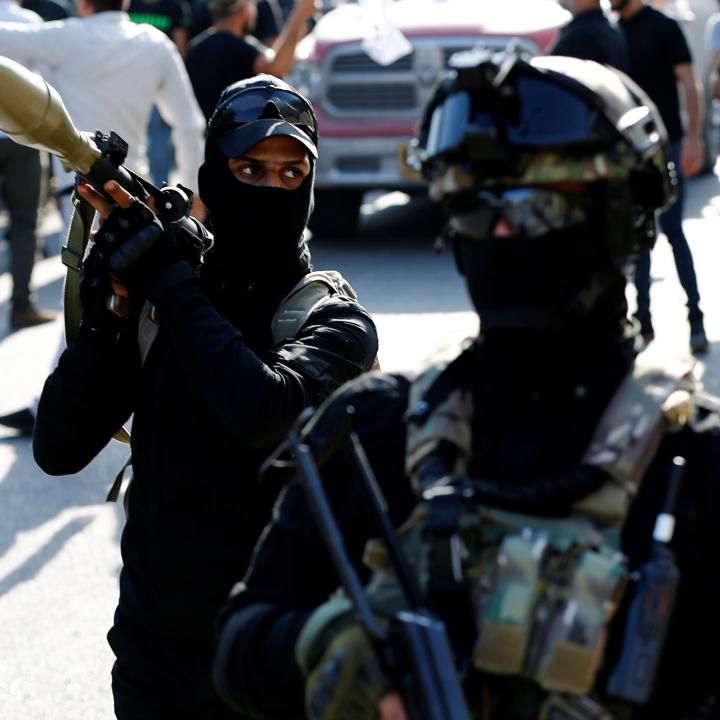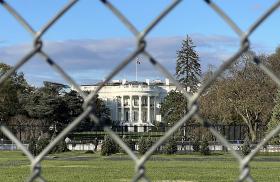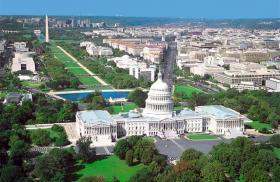
- Policy Analysis
- Fikra Forum
Pro-Iran Militias Are the Big Winners in Iraq’s Election

For many Iraqis who dreamed of a state built on the rule of law and robust institutions, the outcome of this year’s vote feels like a major setback.
In a situation that captures the tragedy of Iraq’s modern political life, ballot boxes no longer reflect the will of the people. They have instead become a legal facade for an Iran-backed project designed to perpetuate Iraq’s fragmentation and drain its institutions by channeling political, economic, and security resources toward Iran-aligned militias and political actors, consolidating their power at the expense of the Iraqi state.
The preliminary results of the 2025 parliamentary election reveal that armed militias and their affiliated political actors have consolidated power, successfully translating their battlefield dominance into substantial parliamentary influence. This outcome sets the stage for “legitimacy laundering,” as militias now operate within formal political structures, potentially shaping government formation and policy to protect their interests and extend their control over Iraq’s political and security institutions.
The numbers themselves tell a disturbing story. The Coordination Framework (CF)—the political umbrella that brings together the parliamentary arms of Iran-aligned militias—secured some 119 seats. Yet the real danger lies not in this total, but in the coalition’s composition. The CF is not a conventional political coalition but a collection of armed groups whose commanders influence national decisionmaking through both ballots and bullets. These warlords—such as Qais al-Khazali, Hadi al-Ameri, and even Nouri al-Maliki—hold formal roles in parliament, but they also control militia forces and security institutions, enabling them to translate their battlefield power into political leverage.
Al-Sadiqoun bloc, the political wing of Asaib Ahl al-Haq, secured twenty-seven seats, while the Badr Organization won eighteen. Harakat Hoquq (the Rights Movement), representing Kataib Hezbollah, obtained six seats. This means that more than fifty parliamentary seats are now held by representatives directly tied to armed groups with independent arsenals that conduct operations outside the state’s legal framework.
This is in addition to the National State Forces Alliance, led by Ammar al-Hakim and Haider al-Abadi, which secured eighteen seats. Although the alliance is not itself an armed actor, it remains a formal member of the CF, where militia-aligned parties dominate strategy and decisionmaking. Its role inside the CF allows it to claim the mantle of “state representation” while simultaneously aligning with factions that operate outside the state’s legal authority. In practice, this positioning provides the armed groups with an added layer of political legitimacy and ensures their alliance retains access to institutional power through a Shia majority bloc that has long functioned as the primary vehicle for their influence.
At the center of this alliance stands Maliki, whose State of Law Alliance secured twenty-nine seats, including four belonging to Kataib Sayyid al-Shuhada, represented in parliament through the Muntasirun bloc, led by Abu Ala al-Walai. Maliki, who is unable to achieve a majority on his own, has positioned himself as the political architect and parliamentary shield for these militias, protecting them from accountability for past abuses, including kidnappings, assassinations, and the suppression of protest movements. His role highlights a deep contradiction: even parties and coalitions that present themselves as “national” or technocratic are intertwined with militia networks.
Muhsin al-Mandalawi’s Iraqi Foundation Alliance (Tahalof al-Asas al-Iraqi), which secured eight seats, has announced its alignment with the CF. Likewise, Abshir Ya Iraq, led by Humam Hamoudi, is moving into the same camp after winning four seats.
The Khadamat Alliance, led by Popular Mobilization Forces (PMF) commander Shibl al-Zaydi, head of Kataib al-Imam Ali, has also emerged as a rising force within the CF, securing five seats. Alongside it stands the Wasit Ajmal bloc, led by Muhammad Jamil al-Mayahi, which won four seats. Together, the two blocs with their nine seats have formally joined Maliki’s camp, further consolidating the parliamentary cohesion of the pro-Iran faction.
Prime Minister Mohammed Shia al-Sudani’s Reconstruction and Development Coalition secured forty-six seats. It includes Harakat Ata, led by PMF chief Faleh al-Fayyad, with ten seats, as well as the Bilad Sumer bloc, known as the Sanad bloc, which is led by Kataib Jund al-Imam commander Ahmed al-Asadi and won six seats.
It has become increasingly clear that Maliki has used his dominant position inside the CF to pull both Harakat Ata and the Bilad Sumer bloc firmly into his orbit by brokering leadership posts, managing committee appointments, and safeguarding legislation that strengthens the PMF. This consolidation strengthens the cohesion of the Iran-aligned faction, enhancing its parliamentary weight and ability to shape government formation and policy outcomes.
Perhaps the most contentious development was the Reconstruction and Development Coalition’s sudden shift toward joining the CF, which it did on November 18 following the parliamentary election. In statements at the Middle East Forum for Peace and Security in Duhok, Sudani justified the move as a pragmatic effort to form the largest parliamentary bloc and facilitate negotiations for the next government, framing it not as his personal ambition but as his responsibility to complete the project he envisions for Iraq.
Sudani also emphasized that the decision was consistent with Iraqi independence, asserting that the country would not serve as a base for foreign influence. This move shocked wide segments of the Iraqi public and surprised the United States, especially since Sudani had repeatedly pledged to curb militia influence and restore the state’s authority.
With this alignment, the CF’s parliamentary bloc jumped from 119 seats to 165, giving it unprecedented political weight and reshaping the balance of power inside parliament. This shift did not involve a mere technical alliance, but was rather a sign of the deepening political dominance of Tehran-aligned forces in the period ahead.
The total number of seats directly tied to armed factions now exceeds sixty-six, more than one-third of the ruling bloc, which underscores the breadth of militia influence inside parliament. This figure includes not only the traditional Iran-aligned parties but also rising coalitions such as the Khadamat Alliance and Bilad Sumer bloc, reflecting how deeply armed groups have embedded themselves at the core of the legislative process. And as these factions move into Maliki’s camp, the pro-Iran bloc grows more cohesive, strengthening its grip on political decisionmaking.
Crucially, on November 18, the CF declared itself the largest parliamentary bloc following the formal integration of Sudani’s Reconstruction and Development Coalition and other Shia groups and individual MPs. This puts the CF in a decisive position to nominate the next prime minister and shape the formation of the new government.
While this deepens the influence of Iran-aligned actors, it also opens a window for Sunni and Kurdish blocs to negotiate over key ministries and policy direction and to counter measures that reinforce militia control—turning cross-sectarian dealmaking into a critical factor in how power will actually be distributed. This stage of negotiations will give non-Shia actors the space to shape government priorities, secure influential ministerial posts, and strengthen legislative oversight. As this analysis from the Foundation for Defense of Democracies points out, no single coalition commands a majority, making cross-sectarian negotiations decisive for the balance of institutional authority and policy direction.
This overlap between parties and armed factions exposes the depth of militia entrenchment within Iraq’s political structure. The names may differ, but the reality remains that most major actors orbit within the gravitational pull of Tehran’s regional agenda, which seeks to consolidate political influence, shape strategic decisionmaking, and secure leverage over Iraq’s security and economic institutions. Such alignment further skews the balance of power toward forces operating outside of state authority, systematically weakening institutions and undermining efforts at governance, accountability, and national sovereignty.
The consequences of this militia surge in parliament extend far beyond political maneuvering. They strike at the heart of the Iraqi state. With dozens of militia affiliates entering parliament, the prospects for a civilian state diminish. Legislative tools that should strengthen public institutions risk being repurposed to legalize and finance militia structures—under the banners of “supporting the Popular Mobilization Forces” or “funding the resistance.”
Parliamentary immunity will shield militia-aligned lawmakers from accountability for past abuses, including kidnappings, assassinations, and the suppression of protest movements. Meanwhile, government security forces—the national army and police—will face systematic weakening to ensure that militias remain the most potent armed actors in the country. The monopoly on the use of force, which should belong to the state, will instead be redistributed to parallel structures loyal to external patrons.
Internationally, the election results present a profound challenge. Governments, and especially the United States, must now decide how to engage with an Iraqi administration in which individuals linked to the U.S.-designated terrorist organizations hold substantial parliamentary authority. Diplomatic, security, and economic agreements will become more complicated. Foreign allies cannot partner with a government whose legislative backbone is shaped by militias that operate beyond state control and which, in some cases, target the interests of those same foreign partners.
Indeed, the reverberations from this election will be felt across the region. Tehran has gained an institutional victory—achieved not through tanks or proxies launching rockets, but through ballot boxes. Iran’s strategy in Iraq has long relied on embedding its allies within state institutions, gradually transforming the government from within. The 2025 election represents the culmination of that project. Armed groups that once operated in the shadows now legislate openly, claiming democratic legitimacy.
This outcome is also inseparable from the mass withdrawal of the Sadrist movement, which left a vacuum the militias eagerly filled. The Sadrist boycott was intended as a protest against the corruption and dysfunction of the political system, but its practical effect was to hand unprecedented influence to pro-Iran factions. Without a counterweight capable of mobilizing millions of voters, the electoral arena became unbalanced, allowing a minority with disciplined organizational networks and large financial resources to dominate.
The broader question now confronting Iraqis is unmistakable: Where is the country heading? The answer lies in these alliances and these numbers, which do not signal democratic transformation but rather a new phase of internal occupation—this time not through foreign armies, but through militias seated beneath the dome of parliament and shielded by the veneer of electoral legitimacy.
For many Iraqis who dreamed of a state built on the rule of law and robust institutions, the 2025 election feels like a setback of historic proportions. The parliament, once envisioned as an arena for national representation, risks becoming a stage for regional power plays. The country is edging closer to a model where the state exists in form but not in function, caught between rival armed groups whose loyalty lies beyond Iraq’s borders.
Yet Iraq’s story is not finished. A reservoir of national consciousness persists among citizens, activists, intellectuals, and political forces who reject the normalization of armed rule. The struggle ahead is not a traditional contest of parties and platforms; it is a confrontation between the idea of a sovereign state and the project of permanent militia dominance. The future of Iraq now hangs in a delicate balance, suspended between two visions: one of nationhood, the other of fragmentation.


